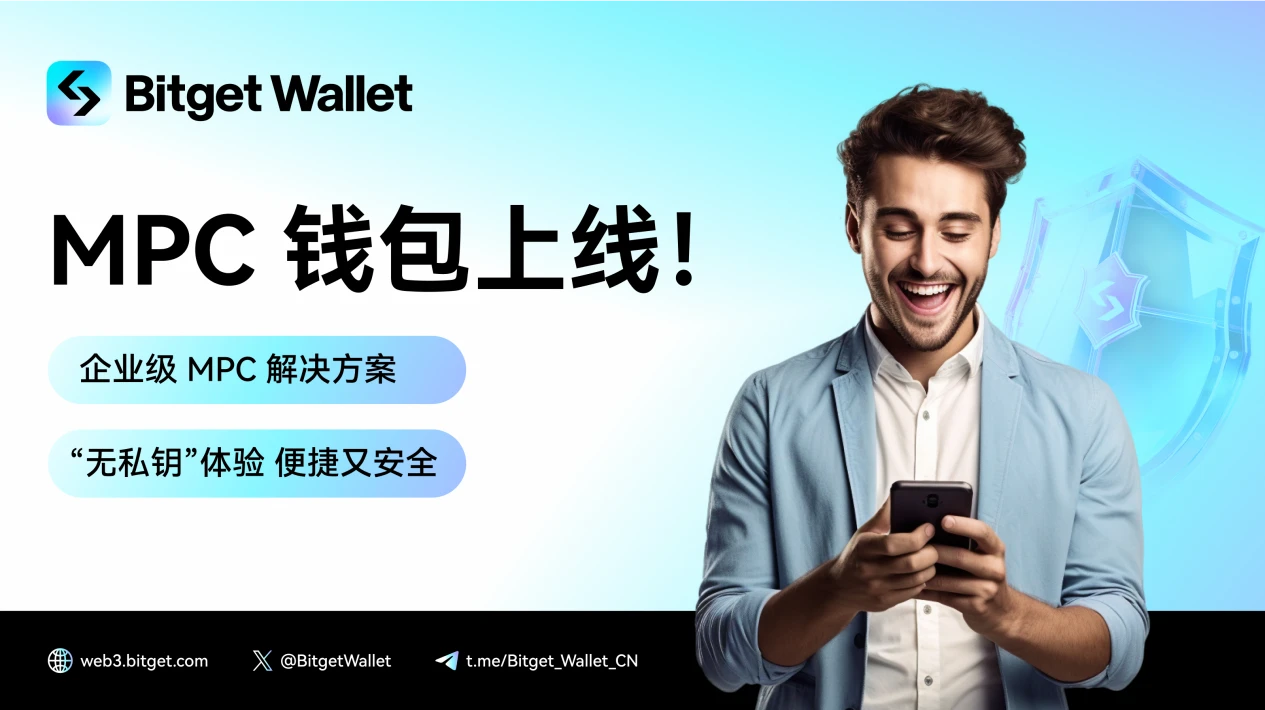In the field of digital assets, the security management of private keys is one of the issues that users are most concerned about. Traditional wallet solutions often require users to memorize or save complex mnemonic words or private keys; once lost or leaked, irreparable asset losses will occur.
In order to solve this security pain point and lower the threshold for users to use the wallet, on October 23,Bitget Wallet (formerly BitKeep) announced the official launch of the MPC private keyless wallet, using enterprise-level MPC (multi-party computing) solutions to provide users with more secure and convenient Web3 wallet services.

“No private key” experience, safe and easy to use
For users, the user experience of the MPC wallet is very different from the EOA wallet currently used by most users; because there is no need to memorize or copy complex mnemonic words or private keys, achieving a private key-free experience.
Bitget Wallets MPC wallet can be created through email login authentication, and even novice users can use it easily and without barriers. In addition, cloud backup of key shards can be completed in 3 simple steps, effectively avoiding various risks of forgetting, losing, and stealing private keys.
It can be said that no private key is easier to use and more secure.
Safe and reliable enterprise-level MPC technology solution
Bitget Wallets MPC wallet adopts the specific Threshold Signature (TSS) technology in MPC and strictly follows the highest security standards. It mainly applies the following technologies: secure large prime numbers, distributed key generation (DKG), and distributed collaborative signatures. , homomorphic encryption, and the most commonly used 2/3 threshold, which can achieve higher security protection levels at each stage.
When creating a wallet, Bitget Wallet generates large prime numbers that are secure against quantum attacks. The Bitget Wallet RD team said, “The generation of secure large prime numbers is to ensure that all aspects of the protocol are subsequently run with the most secure standards, thereby improving the overall anti-attack capability.” The process of generating large prime numbers is only carried out when creating a wallet for the first time. It takes about tens of seconds to wait. Although the users experience will be slower, the security is greatly improved.
When generating the private key of the MPC wallet, Bitget Wallet uses distributed key generation technology and multi-party collaborative calculation to decentrally generate private key shards that implicitly map the complete private key, and each shard always has A fragment will not be transmitted, thus ensuring that the private key fragment will not be leaked and the complete private key will never appear and will not be leaked.
In the signature scenario, Bitget Wallet uses distributed threshold signature technology to keep the private key in the signature process in a dispersed state. The user can complete the transaction signature without exposing the private key, that is, the private key never appears during the entire process, greatly Improve the security of private keys and assets.
The Bitget Wallet RD team said, “Most MPC wallets currently on the market for C-end users prefer the latter between security and convenience. For example, in terms of login verification, they share an account system with centralized exchanges. , although the creation is faster, the risk cannot be dispersed; for example, only using ordinary large prime numbers in the distributed key generation process also sacrifices a certain amount of security.
Reshare mechanism and independent password provide multiple protections
Bitget Wallet also introduces a Reshare mechanism for users. When a user changes to a new device to log in to the wallet, the key fragment of the old device will automatically become invalid and transaction signatures can no longer be completed, greatly reducing the risk of asset loss. At the same time, Bitget Wallet supports setting independent transaction passwords for MPC wallets to ensure that the key sharding on the server will only participate in signature calculations with the users permission.
Users have absolute control over their wallets
Bitget Wallets MPC wallet uses a 2/3 signature mechanism to provide C-side users with a complete set of enterprise-level MPC technology solutions.
2/3 signature mechanism refers to the minimum signature threshold/total number of private key shards = 2/3. One piece is on the users current device (for participating in signature), one is on the platforms server (for participating in signing), and the other is used as Backups can be saved to iCloud, Google Drive and other clouds (not involved in signing, used as backup for Reshare), which is better than hybrid hosting (users and the platform jointly control the private key, and each cannot use funds unilaterally), third-party hosting (the platform controls the private key). keys, which can use user funds) are more decentralized and secure.
In addition, the decentralization of the key shard generation process is ensured by independent generation of secure large prime numbers by all parties instead of rapid generation by a centralized server; users can invalidate the key shards of old devices through Reshare.
In short, it is guaranteed that only users have absolute control over the wallet.
Bitget Wallet has always been pursuing innovation in products and services, and is committed to providing users with better products and more convenient services.
There is a saying within Bitget Wallet that we want to build products and provide services for 1 billion users. Crypto and Web3 are being adopted on a large scale, and infrastructure such as wallets are needed to lower the threshold and provide convenience for users. MPC Wallet is a positive attempt, In the future, we will continue to do more exploration in many areas such as MPC wallet and AA wallet, said Bitget Wallet CEO.
About Bitget Wallet
Bitget Wallet (formerly BitKeep Wallet) is a one-stop Web3 multi-chain wallet that provides users with a full range of on-chain products and DeFi services including wallets, Swap transactions, NFT transactions, DApp browsers, etc.
Since its establishment five years ago, it has been recognized and supported by 12 million users around the world and hundreds of industry leading projects such as Ethereum, BNB Chain, Arbitrum, and Polygon due to its safe and convenient products and services.
In March 2023, the crypto derivatives trading platform Bitget invested US$30 million in BitKeep and became the controlling shareholder; in August,BitKeep officially upgrades its brand name to Bitget Wallet, products and services have been newly upgraded, with transaction as the core, to bring users a better trading experience.
For more information please visit:Website | Twitter | Telegram | Discord










